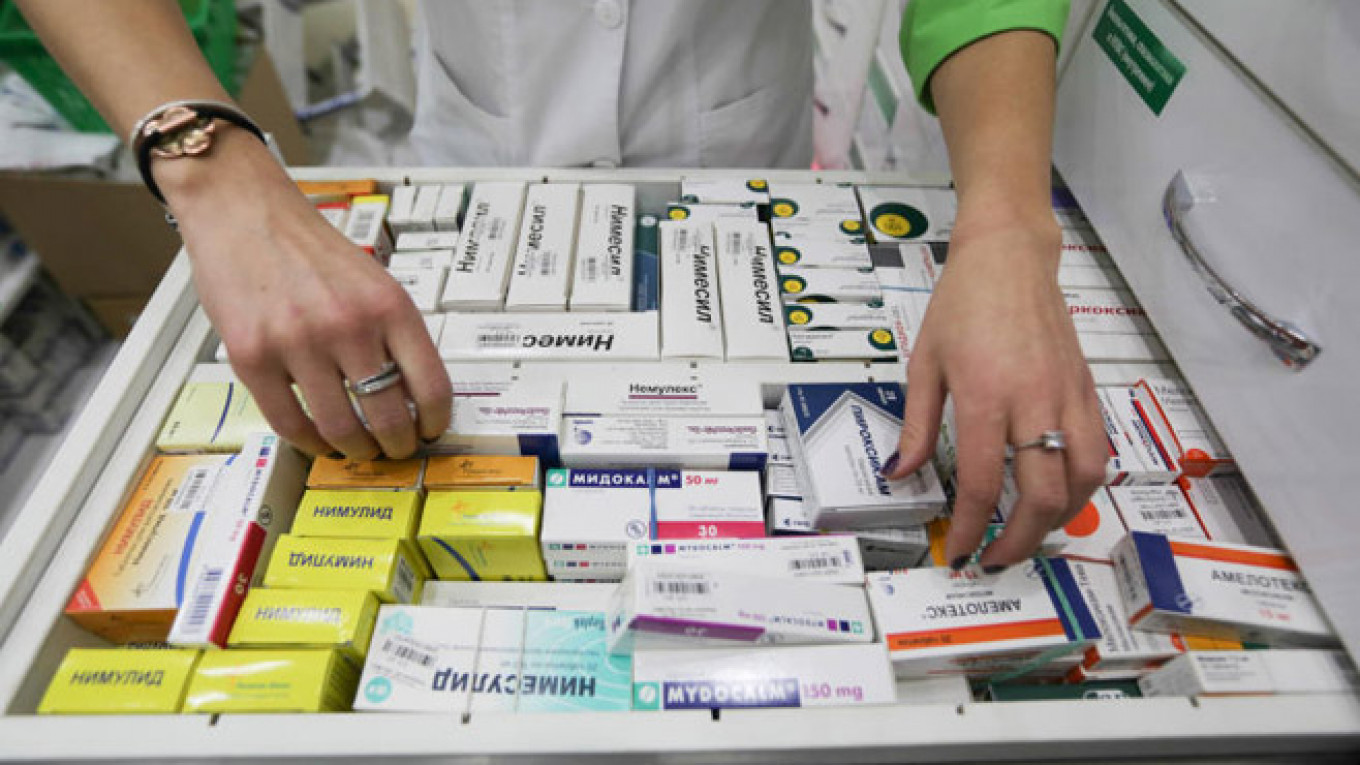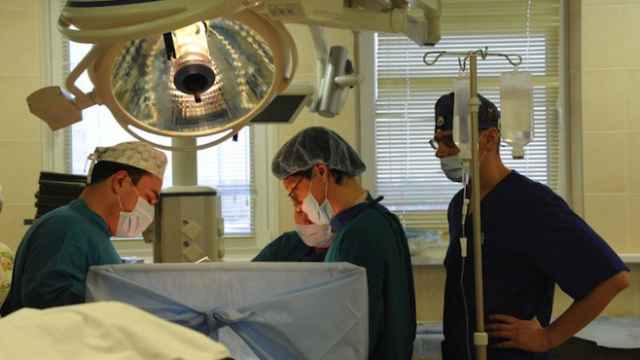Excessive bureaucracy, deficient legislation and an absence of government guarantees are hampering a drive to localize pharmaceutical production in Russia, industry executives said.
Looking to boost foreign direct investment into Russia's ailing economy and protect national security against the backdrop of a trade war with the West over Ukraine, the government's development strategy for the pharmaceutical industry says up to 50 percent of the country's pharmaceutical production should be localized by 2020. Ninety percent of the most important medicines should be made within Russia by 2018.
Russia currently imports about 75 percent of all its medicine, according to DSM Group, a pharmaceutical market research company.
The government also wants to grow exports of pharmaceuticals to more than 100 billion rubles ($2.7 billion) by 2020 from 19 billion rubles ($495 million) last year.
Accelerated Timeline
Since March, when Russia's annexation of Crimea exploded into escalating tit-for-tat sanctions between Moscow and the West, the domestic production program has become more urgent. Sanctions are holding economic growth close to zero, and the West could theoretically go for the jugular by blocking pharmaceuticals producers from selling to Russia.
This week, Deputy Industry and Trade Minister Sergei Tsyb called for the government's list of the most essential medicines — about a quarter of all medicine consumed in Russia — to be almost fully locally produced by 2017.
"We have learned how to make every kind of medicine in Russia," Tsyb was quoted by news agency RIA Novosti as saying. "In two to three years we will be able to locally produce most of the pharmaceuticals on the [government's] list."
The prices of these medicines and vaccines are regulated by the government and are bought by the state under its nationwide health insurance program.
Expanding Market
Russia, an emerging economy with a 143 million, aging population, is an attractive market. Foreign technology is making inroads, both through joint ventures with the participation of international pharmaceuticals majors and through Russian producers applying foreign expertise in local production, according to Yulia Nechayeva, chief analyst at DSM Group.
"In recent years, about a half of top 50 Western pharmaceutical companies have in one way or another entered the Russian market," she said.
Despite a sharp economic downturn, DSM Group expects Russia's pharmaceutical market to grow 9 percent this year, reaching 1.1 trillion rubles ($28.6 billion).
The Holdup
But although localization is a growing trend — pharmaceutical production in Russia has doubled over the last three years — industry experts are doubtful that the government's plans can be realized so fast.
"Transferring technology and setting up production cannot happen overnight. It takes years," Alojz Pungarsek, head of Russian pharmaceutical firm Petrovax Pharm, said at a conference organized by The Moscow Times this week.
Last year, Petrovax Pharm began local production of a vaccine against pneumococcal infection in the Moscow region. It took the company four years to set up the production line. Most of the investment to set up its production came from the U.S.-based pharmaceutical giant Pfizer, Pungarsek said.
Vaccines are big business, and the government is their biggest buyer. But the state does not give long-term guarantees it will purchase them. Petrovax risked setting up local production on just the hope of government orders. If it hadn't got them, it would have struggled to make ends meet.
"A majority of our vaccines are supplied under a state order. After years of setting up production, imagine that some foreign company [that already produces the vaccine] steps in now and is given the state order. That would be very painful," Pungarsek said. To make investors commit, the state should offer long-term contracts or public-private partnerships, he added.
Preferential Treatment
Preferences should be given to producers that register new innovative medicines in Russia, said Yury Litvishchenko, head of the Russian subsidiary of U.S.-based Chiesi Pharmaceuticals.
"Currently, there are no preferences for domestic or foreign companies that register new products, even those produced locally," Litvishchenko said.
This was one of the reasons why out of 146 new innovative drugs invented in the world from 2007 to 2011, less than a third, or 42 of them, have been registered in Russia, he said.
Many countries are striving to localize pharmaceutical production, but they offer benefits for the producers. For example, Singapore and Puerto Rico boosted their local production of medicine by offering tax breaks. Turkey is currently doing the same, guaranteeing long-term state orders.
Russia offers no specific preferences or guarantees.
And then there is the familiar Russian problem of bureaucracy and unformed legislation, according to Snezhana Sharova, a lawyer at law firm Dentons.
Among the legal hazards and gaps faced by prospective investors, there is not even a definition of localization to work with, Petrovax's Pungarsek said.
"Does a locally produced medicine refer to inner packaging, outer packaging or the substance itself? Discussions on this matter have been going on for years, but a definition approved by law has not been found yet."
Contact the author at a.panin@imedia.ru
A Message from The Moscow Times:
Dear readers,
We are facing unprecedented challenges. Russia's Prosecutor General's Office has designated The Moscow Times as an "undesirable" organization, criminalizing our work and putting our staff at risk of prosecution. This follows our earlier unjust labeling as a "foreign agent."
These actions are direct attempts to silence independent journalism in Russia. The authorities claim our work "discredits the decisions of the Russian leadership." We see things differently: we strive to provide accurate, unbiased reporting on Russia.
We, the journalists of The Moscow Times, refuse to be silenced. But to continue our work, we need your help.
Your support, no matter how small, makes a world of difference. If you can, please support us monthly starting from just $2. It's quick to set up, and every contribution makes a significant impact.
By supporting The Moscow Times, you're defending open, independent journalism in the face of repression. Thank you for standing with us.
Remind me later.






